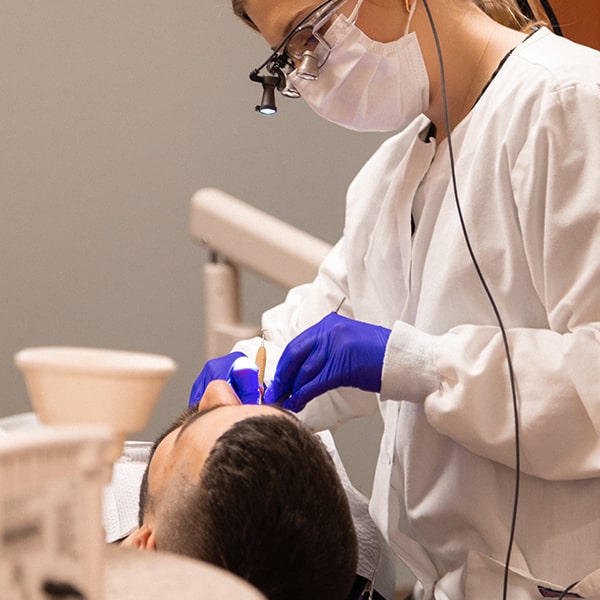BEST Root Canal Specialist Near You
Why Do You Need a Root Canal?
Root canals are a dental procedure that allows dentists to save severely damaged or infected teeth. If your tooth is severely damaged or infected, a root canal specialist can determine whether the tooth can be saved and which treatment is most appropriate. This is an alternative to tooth extraction, which can negatively impact your chewing ability and smile. Early intervention is key. If you’re experiencing significant pain, swelling, or sensitivity in a tooth, an emergency root canal near you might be necessary to address the issue quickly and prevent further complications. Teeth with large cavities, deep fillings, cracks, or even dead pulp may all require root canals to restore their health and function.
On This Page:
How Is a Root Canal Done? | Are Root Canals Painful? | Root Canal Symptoms and Considerations | Care for Teeth with Root Canals
This may take place in 1-2 visits. The dentist will administer a local anesthetic (Novocain) and place a protective shield over the tooth called a rubber dam. The dentist will then remove any decay as well as the inner nerve of the tooth. The tooth is disinfected, and the inside of the tooth is shaped with special instruments called files. The space inside the tooth is then filled with a special dental material called gutta percha (or another suitable material). A temporary filling is then used to seal the tooth.
Understanding the root canal cost in Connecticut is vital for planning your dental care. Typically, the cost of a root canal ranges from $900 to $1500, depending on the tooth’s complexity and location. If you also need a porcelain crown after the procedure, expect to pay about $1200 per tooth. Many dental providers offer payment plans or assistance programs to help make these essential treatments more accessible. Contact us to get a detailed estimate tailored to your needs.
Root canals are performed under local anesthesia and, under normal circumstances, should be painless. If you are told you have an infection and require a root canal, do not wait to have the procedure completed. Teeth that are severely infected may be difficult to anesthetize and may make having a root canal uncomfortable or even painful. If you’re unsure whether your symptoms are normal or signaling a deeper infection, a root canal specialist near you can evaluate the tooth and recommend the right treatment.
If you’re in need of a root canal and crown, you might be concerned about the cost. At Hawley Lane Dental, we understand that dental care can be a significant investment. That’s why we offer affordable root canal and crown options to help you get the care you need without breaking the bank. Our financing plans and insurance coverage can assist you in managing expenses while ensuring you receive top-quality care. A root canal can relieve pain and save your tooth, while a porcelain crown will restore its strength and appearance. Don’t let cost deter you from seeking essential dental care—contact us today to explore your affordable options!
Signs and Symptoms You May Need a Root Canal
Common symptoms you may experience include:


Care for Teeth with Root Canals
To ensure the longevity of a tooth that has undergone root canal treatment, follow these care tips:
- Placement of Dental Crowns & Tooth Caps: Most teeth that have undergone root canals require dental crowns to protect them from fracturing and to prevent bacteria from re-entering the tooth. Delaying or neglecting to place a crown can increase the risk of reinfection.
- Monitoring and Maintenance: Attend regular dental check-ups to monitor the health of the tooth and surrounding tissues. Your dentist may recommend periodic X-rays to detect any signs of infection or complications.
- Additional Treatments: In cases where a root canal-treated tooth becomes reinfected or does not heal properly, additional treatments such as retreatment or an apicoectomy (surgical removal of the tooth’s apex) may be necessary to save the tooth.
Looking for a Root Canal Specialist You Can Count On?
Hawley Lane Dental patients agree that for the best root canal specialist near you in Stratford, CT, call us today! Reach out for professional root canal treatments and find a compassionate root canal specialist dedicated to your dental health! If you’re looking for a dentist near Milford, CT, Hawley Lane Dental offers comprehensive dental services just a short drive away.
-
Monday - 9:00am–5:00pm
-
Tuesday - 8:00am–5:00pm
-
Wednesday - 8:00am–5:00pm
-
Thursday - 8:00am–5:00pm
-
Friday - 8:00am–5:00pm



